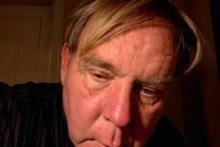John and Ken begin by discussing the influence of John Locke, whose thoughts inspired the structure of the American government, profoundly affected the philosophy of language, and fiercely advocated the assassination of (certain) kings.
William ("Bill") Uzgalis joins the conversation. After a few questions about how Bill came to be interested in John Locke, Bill answers a few questions about Locke's relevance today, then begins to channel, in a sense, the man himself.
Ken asks about the divine right of kings. Did people really believe in it--apparently they did, says Bill. After a bit of chat about Fillmore, John can't help himself, and he asks our channelled Locke if he really wanted to assassinate a king. This leads our hosts to a discussion of Locke's contemporary, practical political persuasions.
John asks about Locke's idea of the state of nature, where people would have lived before the advent of society. Bill/Locke talks about the state of nature as a kind of theoretical litmus test for the legitimacy of a given government, in which something like a golden rule called the "Law of Nature."
The conversation then turns to what Locke would have thought about politics today. Would Locke have been a feminist? Would he have voted Republican? How would he feel about large corporations? Was he really for slavery? How would he have felt about a war based on tea costs, or even the modern Tea Party?
- Roving Philosophical Reporter (Seek to 4:05): Caitlin Esch tells us a bit about Locke's life: his biography, his assignation plots, his relation to the radical Thomists, and even a bit about people named "John Locke."
- Conundrum (Seek to 41:57): A caller asks if her neighbor is immoral for trying to avoid declaring bankruptcy with some big investment losses and a house in foreclosure. Ken and John discuss some of the finer points of the neighbor's obligation in the broader context of America's economic welfare.




Comments (1)
JoseFinch
Monday, November 20, 2023 -- 6:51 PM
googleThe topic of Locke's thoughts on modern politics is then brought up. Is it possible that Locke was a feminist? Had he cast a Republican ballot, yes? What would he think about big businesses? Did he truly support slavery? What would he have space bar clicker thought of the modern Tea Party, or even a war waged on the price of tea?